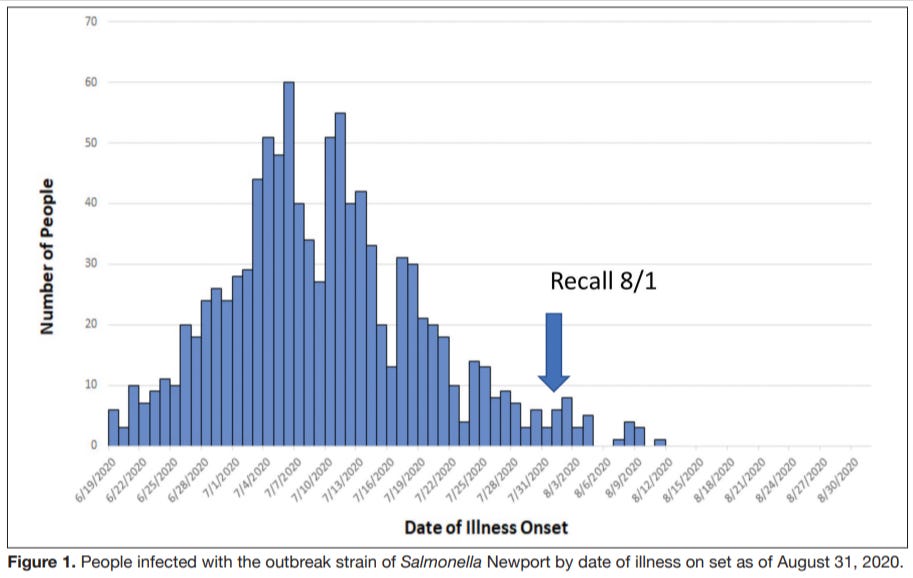Not the strain of virality you'd expect
A very online food safety scandal, the internet's middle class, Disney adults, cancelled teens and ... Catholics

Hi friends. Today is June 24, 2022.
And thanks to Reddit, poor crisis PR, and an unappetizing product called “lentil and leek crumbles,” a lot of Americans just became woke to some long-standing issues with their food.
To recap: Daily Harvest is a trendy, vegan meal-prep company beloved by celebrities and influencers. Lentil and leek crumbles are one of the foods (“foods”?) in their pricey, well-styled arsenal. And beginning in mid-June, a flood of customers on Reddit, Instagram and TikTok — including some influencers who received free product samples from Daily Harvest — began to claim the crumbles made them sick. Like ER visit, hospital stay, organ failure sick.

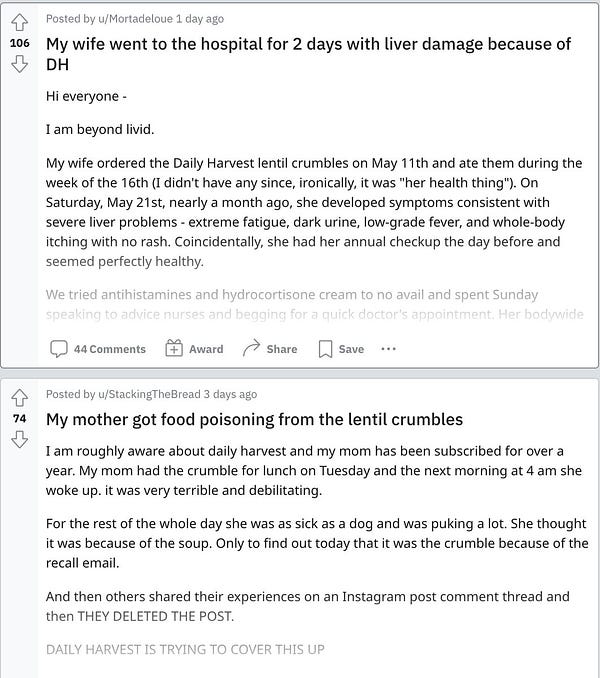
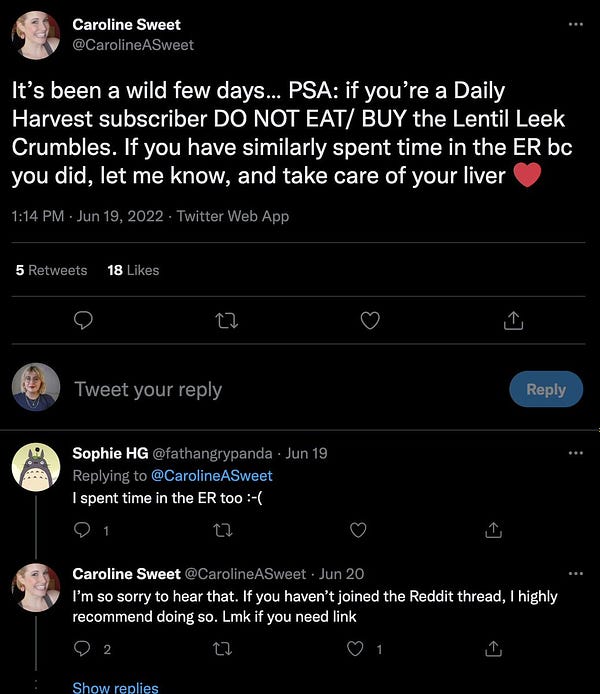
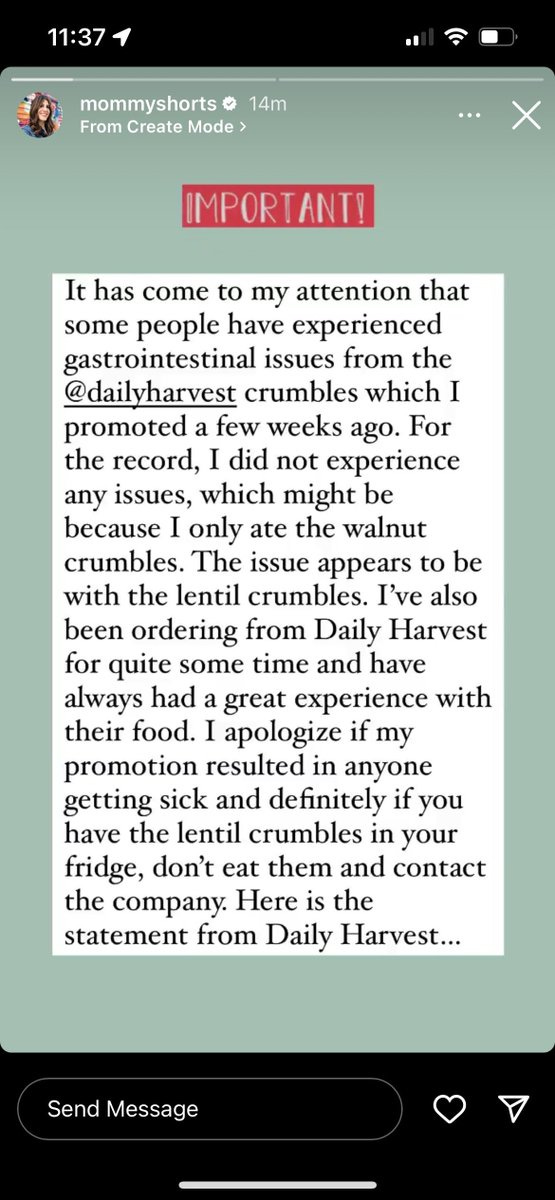
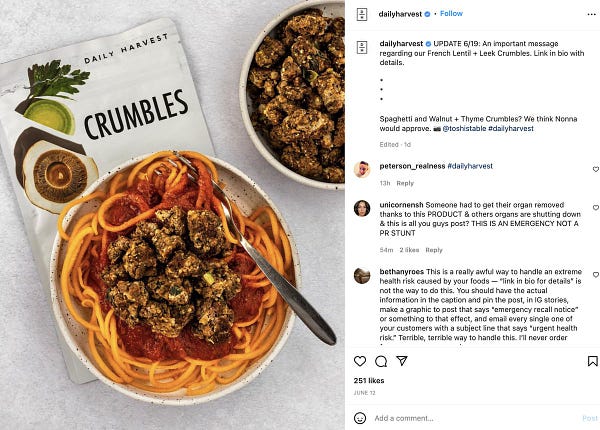
This is not the strain of virality you’d typically expect of a foodborne illness outbreak (… ha ha, a little norovirus joke!). But claims of “extreme sickness” and “debilitating pain” have been liked and shared tens of thousands of times on social media.
As those allegations picked up steam, a second narrative also emerged: Not only were Daily Harvest’s lentils ruining people’s lives, but the company didn’t care enough to issue a statement or recall until several days after the complaints started.

If you think Daily Harvest’s response was slow, however … I have some bad news about the food safety system. It’s not unusual for consumers to find out about contaminated products, even seriously contaminated products, far too late to avoid eating them. (I did cover food policy for a couple years, so I know a little about this!)
Take the recent scandal over contaminated infant formula, which was recalled five months after health officials received reports that it sent a baby to the hospital. Three more infants were hospitalized and two died in the interim.
Or consider that companies that use Jif peanut butter in their products — a food consumed way more widely than any vegan crumble! — are still issuing new recalls in connection with a salmonella outbreak that sickened more than a dozen customers in … April.
What is taking so long? Food recalls are almost always voluntary, and companies do sometimes drag their feet or get caught unprepared. We don’t really know to what extent that may be true at Daily Harvest, which did issue a recall within a week of the complaints and says it’s working with the Food and Drug Administration on next steps.
But the problem goes well beyond individual companies — government bureaucracy also plays a big role. The FDA, one of two agencies tasked with keeping food safe in the U.S., acts like a consultant in most food recalls: reviewing a company’s strategy, publicizing the news and, in some cases, inspecting production facilities or suspect product samples. While companies can issue recalls whenever they want, they often work in tangent with regulators.
A 2017 government audit of 30 high-priority recalls found the agency doesn’t always move quickly, however — in fact, it took 57 days for those companies to initiate recalls, on average, after the FDA first learned of potential problems. The FDA has said that average is far smaller — just four days — across all food recalls.
Either way, the Daily Harvest situation appears pretty average (… at least based on the information that’s available now). But I’d argue that says more about the average than the company itself. Just this April, an organization of food safety experts urged the FDA to speed up its recall processes to keep more people from getting sick. That same month, Helena Bottemiller Evich published a massive take-out on the long-standing, almost comical dysfunction inside the FDA’s food division.
Alas, the more you know, the more you maybe … never want to eat again! Barring that, I’d keep an eye on niche-food-product Reddit.

The classifieds
Subscribe to Girls' Night In, the cult-fave weekly newsletter with over 140,000 readers. Worth-it recommendations for your weekend and cozy vibes, sent straight to your inbox each week. Sign up here.
If you read anything this weekend
“The Story of a Cancelled Teen,” by Elizabeth Weil in The Cut. This is one of two stories I’m sharing today that I actually feel p. ambivalent about — but ambivalent in an interesting, thought-provoking way, rather than your typical “meh let’s scroll on.” Up first, this long look at teenage social dynamics coming out of the two years they’ve lived solely online. (Spoiler: They’re messed up!) But is it just “cancel culture” (ugh) ruining these kids’ lives … or policy failings at both the school and federal level?
“The Rise of the Internet’s Creative Middle Class,” by Cal Newport in The New Yorker. Here’s ambivalent story #2: a survey of the “1000 fans” theory and how history disproved it (fascinating!), book-ended by anecdotes from a YouTube news channel that purportedly proves self-employed creators can make it work (random, unconvincing). Also lol that the New Yorker says $100k is “middle class.” Not in Buffalo, my friend! And don’t most of their staffers make far less than that??
“The Delivery Apps Reshaping Life in India’s Megacities,” by Edd Gent in MIT Technology Review. If you think ultra-fast delivery apps have been “disruptive” here, look at cities like Bangalore — where the arrival of these services may imperil more than 12 million tiny, family-owned, community-minded neighborhood stores.
“How ‘Disney Adults’ Became the Most Hated Group on the Internet,” by EJ Dickson in Rolling Stone. As told by “a slew of academics, internet culture and fandom experts, and, yes, Disney adults.” *Truly* magical.
“How Catholicism Became a Meme,” by Rebecca Jennings in Vox. As a lapsed Catholic/graduate of an all-girls Catholic school, I can say with some confidence that the church can be “transgressive” (i.e., in violation of boundaries and norms). Just … not usually in the fun aesthetic ways you’ve seen on social media.
👉 ICYMI: The most-clicked link from last week’s excellent guest newsletter was this piece on the end of the “millennial lifestyle subsidy.”
Postscripts
Strava spies. “Receipts culture.” DALL·E mini’s sari obsession. TikTok is killing TV and Gen Z killed the personal brand. How BTS became a BFD. Alexa just got creepier. RIP Internet Explorer and @Sweden, Twitter’s best shitposter.
TikTok crowned a new champion. AI “created” a craft beer. Speaking of, if you thought Google’s “sentient AI” was crazy — just look at the AI they’re working on here. The “unassuming website” saving sewing history. The (literal) cult inside Google. Finally, this week in things Facebook should not but does track: hospital patients and abortion seekers.
That’s it for this week! Until the next one. Warmest virtual regards.
— Caitlin
P.S. You guys are forever sending me awesome links I haven’t seen, and I wanna lean into your collective genius. Please send me your favorite articles and tweets for next week’s edition.


